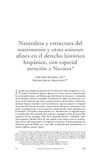Mostrar el registro sencillo del ítem
Naturaleza y estructura del matrimonio y otras uniones afines en el derecho histórico hispánico, con especial atención a Navarra
| dc.creator | Monreal Zia, Gregorio | es_ES |
| dc.creator | Jimeno Aranguren, Roldán | es_ES |
| dc.date.accessioned | 2017-11-24T10:22:31Z | |
| dc.date.available | 2017-11-24T10:22:31Z | |
| dc.date.issued | 2010 | |
| dc.identifier.issn | 0032-8472 (Print) | |
| dc.identifier.issn | 2530-5824 (Electronic) | |
| dc.identifier.uri | https://hdl.handle.net/2454/26335 | |
| dc.description.abstract | Desde una perspectiva general de los diferentes reinos hispánicos y centrando la mirada de manera especial en el caso navarro, se observan los principales temas o problemas que determinan la estructura y naturaleza de las distintas uniones conyugales. Se inducen la estructura y carácter de la institución del marco externo donde se desenvuelve: condicionamientos religioso-morales y socio-económicos, vigencia espacial y temporal de las distintas formas de unión, carácter de la ordenación, autonomía de la unión conyugal frente a otras instancias institucionales, fines asignados por la sociedad y el Estado a estas uniones, etc. Se atiende, en segundo lugar, a la tipificación del contenido del consorcio conyugal a través de la posición respectiva de los cónyuges, valor de la potestad marital y fidelidad, entre otros aspectos. | es_ES |
| dc.description.abstract | Viewed from the perspective of the Hispanic Kingdoms, and focusing in particular on the case of Navarre, several topics and problems determining the structure and nature of the different kinds of marriages are addressed. The structure and nature of the institution are deduced from the external framework within which it takes place: religious and moral conditioning factors, social and economic factors, the validity of the different unions in time and space, the nature of the ordinance, the autonomy of marriage vis-à-vis other institutions, the purposes assigned by society and the state to these marriages, etc. The paper also explores the typology of the marital consortium through, among other aspects, the respective position of the spouses, the validity of the legal authority of the marriage and fidelity. | en |
| dc.description.sponsorship | El presente trabajo se elaboró en el proyecto de investigación Cuestiones actuales en torno a la familia: un estudio interdisciplinar, dirigido por la Prof. Dra. Elsa Sabater Bayle, financiado por el Gobierno de Navarra. Código 1745 (2006-2008). | es_ES |
| dc.format.extent | 38 | |
| dc.format.mimetype | application/pdf | en |
| dc.language.iso | spa | en |
| dc.publisher | Gobierno de Navarra. Institución Príncipe de Viana | es_ES |
| dc.relation.ispartof | Príncipe de Viana, 250 (2010), 501-538 | es_ES |
| dc.rights | Creative Commons Attribution-NonCommercial 4.0 International (CC BY-NC 4.0) | en |
| dc.rights.uri | http://creativecommons.org/licenses/by-nc/4.0/ | |
| dc.subject | Derecho histórico hispánico | es_ES |
| dc.subject | Uniones conyugales | es_ES |
| dc.subject | Consorcio conyugal | es_ES |
| dc.subject | Navarra | es_ES |
| dc.title | Naturaleza y estructura del matrimonio y otras uniones afines en el derecho histórico hispánico, con especial atención a Navarra | es_ES |
| dc.type | Artículo / Artikulua | es |
| dc.type | info:eu-repo/semantics/article | en |
| dc.contributor.department | Derecho Público | es_ES |
| dc.contributor.department | Zuzenbide Publikoa | eu |
| dc.rights.accessRights | Acceso abierto / Sarbide irekia | es |
| dc.rights.accessRights | info:eu-repo/semantics/openAccess | en |
| dc.type.version | Versión publicada / Argitaratu den bertsioa | es |
| dc.type.version | info:eu-repo/semantics/publishedVersion | en |
| dc.contributor.funder | Gobierno de Navarra / Nafarroako Gobernua: Código 1745 (2006-2008) | es |



